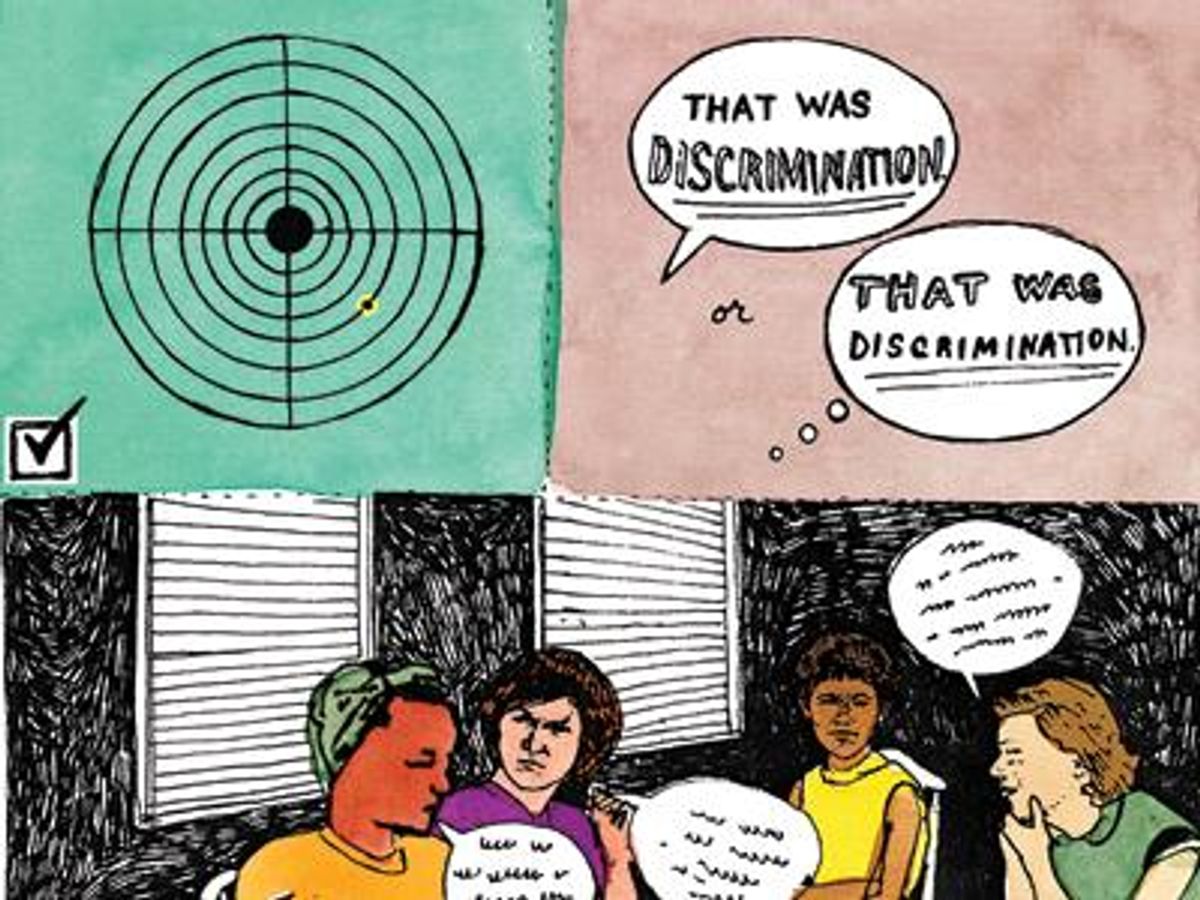
Microaggressions are those barely-there slights, they're the many tiny slights that grate across our days.
July 18 2014 4:01 AM EST
November 17 2015 5:28 AM EST
By continuing to use our site, you agree to our Private Policy and Terms of Use.

I loved my neighbors; we'd freely wander in and out of each other's houses, and I would joke they were faster at calling me than an alarm company if someone unusual was nosing around the house. But then they moved away. As I sit in my backyard writing this, I realize I'm hoping the new neighbors don't come outside, because the new neighbors never speak to me.
I tried to be friendly when they moved in, introducing myself to the dad, but the mother so assiduously avoided being near enough to speak to me I wondered if she didn't know English. Turns out it's her native language, which just leaves me wondering why she went to such lengths to avoid talking to me.
What does your mind go to in these instances? I'm white, so in my case I don't have to wonder if it's racism. Instead my mind immediately goes to the fact that I'm openly trans. But then I second-guess myself: Have I imagined it all? Wait, is it really just because I don't mow my lawn enough?
This example is something researchers call a microaggression. Microaggressions are those barely-there slights, nothing bold enough to be declarative -- they're the many tiny slights that grate across our days. A defining feature of a microaggression is it is so light as to leave you wondering if it existed. Are you being hyper- sensitive? If you challenge someone who's committed a microaggression, they often insist it didn't exist, leaving you wondering if you're slightly crazy. As more research unfolds, we see that minority populations often live in a wash of microaggressions.
We realize all those questions I've asked myself--"Did I make it up?"--take their toll. In an interesting study ("Cognitive costs of exposure to racial prejudice," by J. Salvatore and J.N. Shelton, published in Psychology Science in 2007), participants who witnessed an ambiguously racist interaction were more cognitively impaired afterward than those who witnessed a clearly racist interaction. Outright discrimination is easier for us to externalize, to blame the discriminators. When it's unclear, we question ourselves.
"Am I too sensitive?" is another common but misleading reaction. Sure, every time someone uses the wrong pronoun, avoids pronouns altogether, or gives you the cold shoulder it seems like a minor event, but we know a lot more now about how these seemingly minor events start to add up. Next thing I know, I'm wondering about the neighbors across the street. Could their reticence be for the same reason? More importantly, it's not just a conversation that's being acted out in our heads. There's an effect on our bodies.
When people think about trans health, they often think in terms of grand health problems. Certainly our communities have enough of them to shock anyone. Suicidality, violence, being turned down for care by doctors, being fired from jobs; statistics show that most every trans per- son can find one of those major negative health events in their own life history.
But what about all those microaggressions? Turns out the cumulative effect of these tiny events has a very real toll on our health as well. Dr. Derald Wing Sue has been a leading researcher on the impact of micro-aggressions for minority populations. In his book Microaggressions in Everyday Life: Race, Gender, and Sexual Orientation, he reviews the evidence, and it's stark. Yes, one microaggression alone is a small event, but they don't wash away after they occur, they add up. For many trans people, we can experience several, if not even dozens of these slights in a day. For anyone who's a member of multiple minority groups, such as trans people of color, or trans women, the odds are even higher that you're experiencing such slights routinely.
Sue reviews research that shows the danger of microaggressions is in how they're both chronic and cumulative. "They have been found to cause psychological distress, depress the immune system, increase susceptibility to infections and diseases, decrease subjective well-being and life satisfaction, and increase anxiety, depression and all forms of mental disorders."
Information about trans health outcomes is woefully inadequate, but what we have is alarming: we smoke at rates that are 50% higher than non-LGBT people, a quarter of us report misusing drugs or alcohol to cope with stigma, 41% of us have attempted suicide. Yes, we need to eliminate violence and all the other major traumas, but now we know that if we want our health to be better, we also have to fight back against the tiny slights.
What can be done to help heal from these slights? Stop second-guessing yourself. Trans people have extremely finely tuned radar; it tells us how someone is reading us, if the situation seems safe or if it's welcoming. If your radar is alerting you, trust it.
Call it out for what it is: discrimination. This doesn't necessarily mean you have to confront the aggressor; that can be hard with these tiny slights. Acknowledge the microaggression yourself, remember it's easier to de-identify with it if you label it as discriminatory.
Reach out to people you trust for support. As Sue notes, social support is a powerful means to counter the negative effects of stigma, it's a natural buffer against hostile society, and it pro- vides "cultural nutrients" that validate our experiences.
Or maybe think about growing some bamboo to act as a living fence between your yard and theirs. That's what I'm thinking about doing.
Want more breaking equality news & trending entertainment stories?
Check out our NEW 24/7 streaming service: the Advocate Channel!
Download the Advocate Channel App for your mobile phone and your favorite streaming device!
